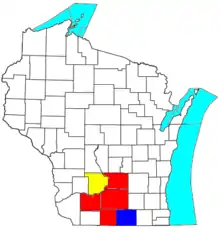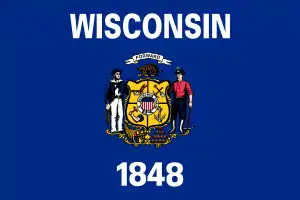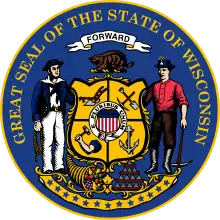Madison, Wisconsin, metropolitan area
The Madison, Wisconsin, metropolitan area, also known as Greater Madison, is the metropolitan area surrounding the city of Madison, Wisconsin. Madison is the state capital of Wisconsin and is Wisconsin's second largest city (after Milwaukee), and the metropolitan area is also the state's second largest (after the Milwaukee metropolitan area).
The Madison, WI Metropolitan Statistical Area (MSA), as defined by the United States Office of Management and Budget, is the area consisting of Columbia, Dane, Green, and Iowa counties[1] in Wisconsin, anchored by the city of Madison. As of the 2010 census, the MSA had a population of 605,435. The latest Census estimate as of July 1, 2019 puts the population at 664,865, making it the 89th largest in the United States.[2]
The Madison–Janesville–Beloit Combined Statistical Area (CSA) consists of the four counties in the Madison MSA as well as Rock County (Janesville–Beloit metropolitan area) and Sauk County (Baraboo micropolitan area). The CSA population as of the 2010 census was 827,742. The CSA's 2019 population estimate was 892,661, making it the 63rd largest in the United States.[2]

Definitions
The Madison–Janesville–Beloit Combined Statistical Area (CSA) is made up of six counties.[1] The statistical area includes two metropolitan areas and one micropolitan area.
- Metropolitan Statistical Areas (MSAs)
- Madison (Columbia, Dane, Green, and Iowa counties)
- Janesville–Beloit (Rock County)
- Micropolitan Statistical Areas (μSAs)
- Baraboo (Sauk County)
| Historical population | |||
|---|---|---|---|
| Census | Pop. | %± | |
| 1840 | 7,028 | — | |
| 1850 | 69,416 | 887.7% | |
| 1860 | 162,791 | 134.5% | |
| 1870 | 192,943 | 18.5% | |
| 1880 | 194,207 | 0.7% | |
| 1890 | 206,572 | 6.4% | |
| 1900 | 230,598 | 11.6% | |
| 1910 | 241,109 | 4.6% | |
| 1920 | 261,670 | 8.5% | |
| 1930 | 291,385 | 11.4% | |
| 1940 | 320,791 | 10.1% | |
| 1950 | 378,060 | 17.9% | |
| 1960 | 454,377 | 20.2% | |
| 1970 | 547,469 | 20.5% | |
| 1980 | 599,470 | 9.5% | |
| 1990 | 649,147 | 8.3% | |
| 2000 | 742,953 | 14.5% | |
| 2010 | 827,742 | 11.4% | |
| 2019 (est.) | 892,661 | [3] | 7.8% |
| U.S. Decennial Census[4] 1790–1960[5] 1900–1990[6] 1990–2000[7] 2010–2014[8] | |||
The CSA totals are the totals of all the counties listed above, regardless of whether they were included in the Combined Statistical Area at the time.
Communities
The following are the incorporated communities of the Madison–Janesville–Beloit Combined Statistical Area. Populations listed are 2019 estimates.[9]
Communities marked with an asterisk (*) are part of the Janesville–Beloit metropolitan statistical area (Rock County). Communities marked with a cross (†) are part of the Baraboo micropolitan statistical area (Sauk County). The remainder are part of the Madison metropolitan statistical area.
Cities with more than 50,000 inhabitants
- Madison (259,680)
- Janesville* (64,575)
Cities with 10,000 to 50,000 inhabitants
Cities with less than 10,000 inhabitants
- Brodhead (3,247)
- Columbus (5,120)
- Dodgeville (4,695)
- Edgerton* (5,631)
- Evansville* (5,440)
- Lodi (3,092)
- Milton* (5,627)
- Mineral Point (2,465)
- Monona (8,175)
- Reedsburg† (9,521)
- Wisconsin Dells† (partial) (2,992 total)
Villages with less than 10,000 inhabitants
- Albany (993)
- Arena (827)
- Arlington (820)
- Avoca (623)
- Barneveld (1,251)
- Belleville (2,463)
- Black Earth (1,419)
- Blanchardville (partial) (791 total)
- Blue Mounds (986)
- Brooklyn (1,465)
- Browntown (276)
- Cambria (748)
- Cambridge (partial) (1,535 total)
- Cazenovia† (partial) (310 total)
- Clinton* (2,140)
- Cobb (449)
- Cottage Grove (7,143)
- Cross Plains (4,286)
- Dane (1,135)
- Deerfield (2,532)
- Doylestown (297)
- Fall River (1,741)
- Footville* (831)
- Friesland (345)
- Highland (826)
- Hollandale (275)
- Ironton† (252)
- La Valle† (361)
- Lake Delton† (2,987)
- Lime Ridge† (163)
- Livingston (partial) (634 total)
- Loganville† (298)
- Maple Bluff (1,311)
- Marshall (3,984)
- Mazomanie (1,696)
- Merrimac† (440)
- McFarland (9,031)
- Monticello (1,202)
- Montfort (partial) (688 total)
- Mount Horeb (7,534)
- New Glarus (2,151)
- North Freedom† (697)
- Orfordville* (1,498)
- Pardeeville (2,063)
- Plain† (766)
- Poynette (2,510)
- Prairie du Sac† (4,431)
- Randolph (partial) (1,747 total)
- Rewey (282)
- Ridgeway (630)
- Rio (1,039)
- Rock Springs† (360)
- Rockdale (216)
- Sauk City† (3,485)
- Shorewood Hills (2,001)
- Spring Green† (1,641)
- West Baraboo† (1,424)
- Windsor (7,644)
- Wyocena (725)
Census-designated places
Towns
Columbia County
Dane County
- Albion
- Berry
- Black Earth
- Blooming Grove
- Blue Mounds
- Bristol
- Burke
- Christiana
- Cottage Grove
- Cross Plains
- Dane
- Deerfield,
- Dunkirk
- Dunn
- Madison
- Mazomanie
- Medina
- Middleton
- Montrose
- Oregon
- Perry
- Pleasant Springs
- Primrose
- Roxbury
- Rutland
- Springdale
- Springfield
- Sun Prairie
- Vermont
- Verona
- Vienna
- Westport
- York
Green County
Iowa County
Rock County
Demographics
As of the census[10] of 2000, there were 501,774 people, 202,687 households, and 121,171 families residing within the MSA. The racial makeup of the MSA was 90.26% White, 3.50% African American, 0.32% Native American, 2.99% Asian, 0.03% Pacific Islander, 1.27% from other races, and 1.63% from two or more races. Hispanic or Latino of any race were 3.05% of the population.
The median income for a household in the MSA was $45,602, and the median income for a family was $55,159. Males had a median income of $35,250 versus $26,322 for females. The per capita income for the MSA was $21,832.
See also
References
- "OMB Bulletin No. 13-01: Revised Delineations of Metropolitan Statistical Areas, Micropolitan Statistical Areas, and Combined Statistical Areas, and Guidance on Uses of the Delineations of These Areas" (PDF). United States Office of Management and Budget. February 28, 2013. Archived from the original (PDF) on March 19, 2013. Retrieved May 22, 2015.
- "Metropolitan and Micropolitan Statistical Areas Population Totals and Components of Change: 2010-2019". United States Census Bureau, Population Division. April 2019. Retrieved August 28, 2020.
- "County Totals Dataset: Population, Population Change and Estimated Components of Population Change: April 1, 2010 to July 1, 2019". Retrieved January 7, 2019.
- "U.S. Decennial Census". United States Census Bureau. Retrieved August 9, 2015.
- "Historical Census Browser". University of Virginia Library. Retrieved August 9, 2015.
- Forstall, Richard L., ed. (March 27, 1995). "Population of Counties by Decennial Census: 1900 to 1990". United States Census Bureau. Retrieved August 9, 2015.
- "Census 2000 PHC-T-4. Ranking Tables for Counties: 1990 and 2000" (PDF). United States Census Bureau. April 2, 2001. Retrieved August 9, 2015.
- "State & County QuickFacts". United States Census Bureau. Archived from the original on July 17, 2011. Retrieved January 23, 2014.
- "City and Town Population Totals: 2010-2019". Census.gov. United States Census Bureau. Retrieved August 28, 2020.
- "U.S. Census website". United States Census Bureau. Retrieved 2008-01-31.


